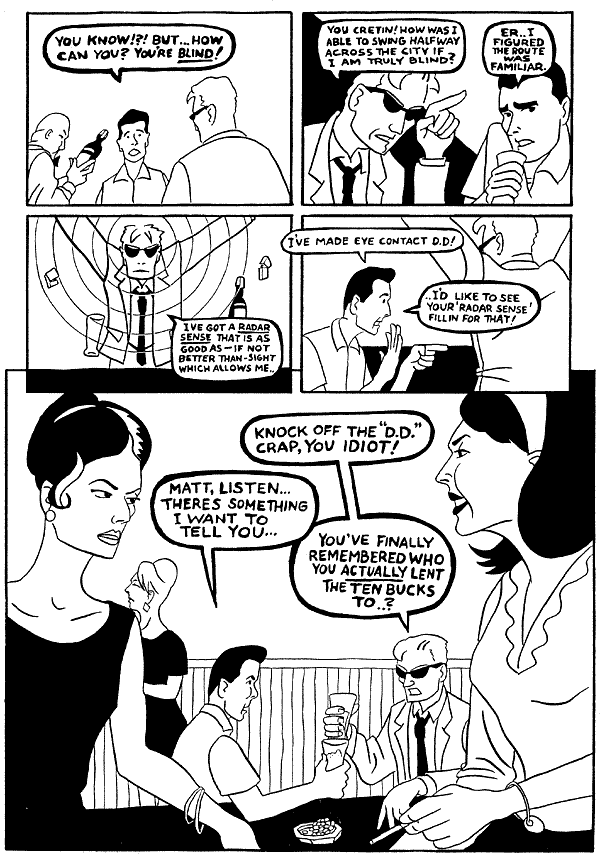

Amateur |
Links: ZUM! |
Once upon a time, in a comic community not so different from
our own, it seemed that there were only two sorts of people. You could either
be a 'fan', usually a buyer, reader and collector of US comic books, or a 'pro',
a writer, artist or editor working to produce the comic books bought, read and
collected by fans. The comic retailers and 'dealers' seemed to be left out of
this social relationship, unless they doubled as fans or pros, and pros often
doubled as fans anyway. So the fan was the common element and the pro was a kind
of superfan, with special contributory powers. This was, in effect, a fan's-eye
view of social identity, with comics and their contents as its currency.
Fastforward
to just after the comic collectors' speculator bubble burst. The slump in the
direct market, the firm sales system of distribution built by fans - their bid
to become 'pros' - that had grown to encompass almost the whole US comic industry,
precipitated a questioning and a revaluation of the currency on all sides.
Amateur captures some of the feeling of that latter period. Chris
Butler's written intro puts it in its very title 'Marvel
Comics Were Ace' -
ie they aren't anymore. It's not simply a matter of disappointment or desperation.
It seems to involve a kind of yearning to have Marvel comics' value restored.
Amateur puts the yearning into practice, taking the next step and trying to reinsert
Marvel superheroes into a history marked by personal understanding or brought
by the passage of time.
First up, Steve Martin's treatment of Captain America puts Cap
in 1942 Russia following the Red
Skull, but in a winter setting which
could be derived from the Nazi's invasion of the USSR as they slaughtered their
way through what is now Belarus. Martin puts in the scenes that would have been
left out of a Marvel Cap story: bodies from mass executions taken away for a
christian burial, soviet guards kicking crucifixes from graves, an old woman
making Cap wear the military fur hat that belonged to her dead son before returning
Cap to the fighting.
The
second story, New York 1966 by Gavin Butler and pre-Guardian
Jonathan Edwards, features the FF with Johnny
Storm as alienated youth in Lost Weekend mode who
hides from his sister and Reed Richards in a friendly lesbian bar. In the last
story, Chris and Gavin Butler have Peter Parker drag Matt
Murdoch uptown to pull
by impressing a pair of ladies with Pete and Matt's super identities.
All
stories turn on common humanity and a lack of uncomplicated resolution - that
is, truer to social identity as lived outside the classic comic fan community,
or indeed the classic Marvel comic. The FF story contains the closest attention
to illustrative detail, enabling Edwards create strong characters graphically.
However, despite a trite ending, it's Cap's moment in Russia which is the most
touching, in that the real history of Eastern Europe is still out there, and
still haunted by memories made of the materials used for this story's background.
Steve Edgell
| Amateur: 2 A4 pages, colour ctock cover with B&W tipping. |
Price: £2 +P+P? Would strongly advise
checking availablity. Address: Steve Martin, Mitch & Murray Ltd, 40 Glouster St, Newton, Chester, CH1 3HR. |
Received at ZUM! HQ: no info Review Posted: 13i04 |
